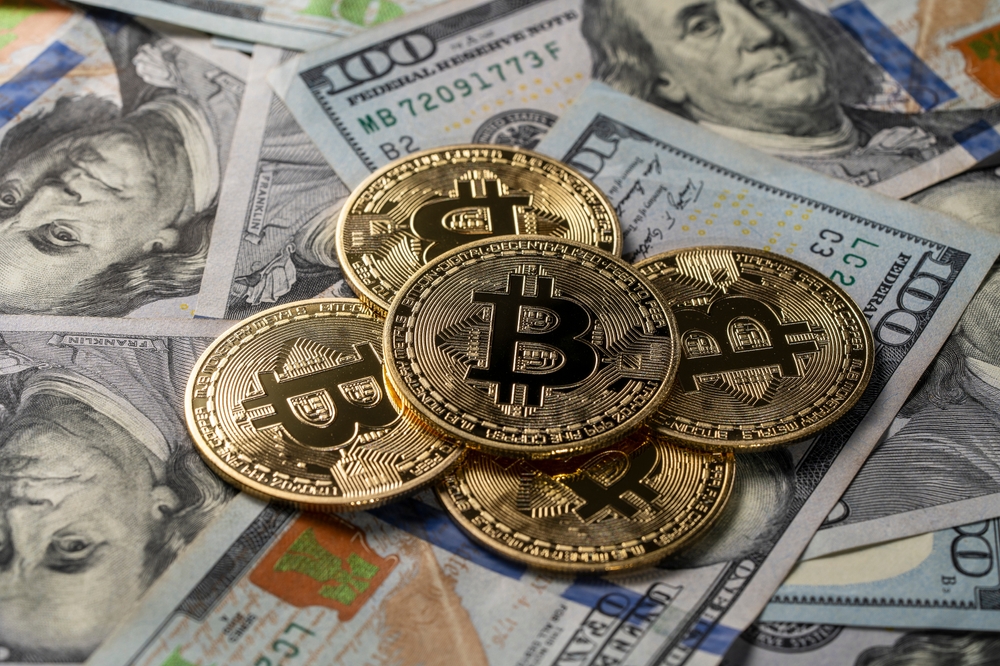Bitcoin Nears $100K as Trump Trade Deal With UK Looms
08.05.2025 15:51 3 min. read Ruholamin Haqshanas
Bitcoin surged toward the $100,000 milestone on Thursday, reaching as high as $99,621—its highest level since February—as investors reacted to geopolitical optimism surrounding a potential U.S.-UK trade deal.
The rally was part of a broader crypto upswing, with Ether also jumping 8% to $1,943, its strongest intraday performance since early April.
The latest price movement follows Wednesday’s announcement that U.S. officials will resume trade negotiations with China in Switzerland, signaling a possible thaw in trade tensions.
Trump Teases ‘Major Trade Deal’ Likely With UK
President Donald Trump further stoked speculation by posting on social media about a forthcoming “major trade agreement,” which multiple reports suggest will involve the United Kingdom.
Bitcoin had previously reached an all-time high of $109,241 in January, buoyed by expectations that Trump’s pro-crypto stance would lead to a rollback of regulatory pressure seen during the Biden administration.
However, subsequent trade war concerns triggered a sharp correction, pushing the asset down nearly 32% to below $75,000 in April.
“A round number like $100,000 often invites profit-taking,” said Rachael Lucas, crypto analyst at BTC Markets. “If Bitcoin breaches that level, we may see a period of consolidation as traders lock in gains.”
Michael Saylor checking the price of bitcoin today pic.twitter.com/yfzNU1ehNv
— Documenting ₿itcoin 📄 (@DocumentingBTC) May 8, 2025
Ether’s recovery comes after a sluggish period marked by investor uncertainty and increased competition from rival blockchain ecosystems.
A recent Ethereum upgrade, aimed at improving scalability and competitiveness, had failed to ignite much price action—until now.
With optimism returning to the market, crypto investors are closely watching for official confirmation of Trump’s trade agreement and whether Bitcoin can finally breach the highly anticipated $100,000 threshold.
Trump Holds Firm on China Tariffs as Trade Talks Set to Begin
Meanwhile, Trump has reaffirmed his hardline stance on China by stating he would not reduce the current 145% tariffs on Chinese goods, even as high-level trade talks between the U.S. and China are set to take place in Switzerland this weekend.
While Trump won’t meet with Chinese President Xi Jinping, Treasury Secretary Scott Bessent and Trade Representative Jamieson Greer will lead the U.S. delegation.
China is reportedly preparing to exempt some U.S. goods from its 125% tariffs in a bid to deescalate tensions without making overt concessions.
On the economic side, Federal Reserve Chair Jerome Powell cautioned that the full economic impact of Trump’s tariffs has yet to materialize.
The Fed held interest rates steady, awaiting more data on how the trade war might ripple through the economy.
Trump, following a recent meeting with Canadian Prime Minister Mark Carney, emphasized that the burden of making trade deals rests on other nations, saying, “We don’t have to sign deals — they have to sign deals with us.”
In related developments, companies are already adapting to the shifting trade landscape. Luxury automaker Ferrari is implementing a two-tiered pricing strategy to offset Trump’s new 25% tariff on foreign auto imports.
-
1
Bitcoin Shouldn’t Be Taxed, Says Fund Manager
07.07.2025 9:00 2 min. read -
2
Altcoins Gain Momentum as Bitcoin Dominance Drops to 61.6%
17.07.2025 15:30 2 min. read -
3
Bitcoin Enters new Discovery Phase as Profit-Taking Metrics rise and outflows dominate
06.07.2025 8:00 2 min. read -
4
U.S. Lawmakers Target El Salvador With Crypto Sanctions Plan
10.07.2025 15:00 2 min. read -
5
Strategy’s $60 Billion Bitcoin Portfolio Faces Mounting Risks, CryptoQuant Warns
10.07.2025 16:36 3 min. read
Elon Musk’s SpaceX Moves $150M in Bitcoin
SpaceX has moved 1,308 BTC—worth roughly $150 million—to a new wallet address, marking its first on-chain activity in more than three years.
Here’s When the Bitcoin Cycle May Peak, Based on Past bull Markets
According to a new chart shared by Bitcoin Magazine Pro, the current Bitcoin market cycle may be entering its final stretch—with fewer than 100 days remaining before a potential market top.
Bitcoin Price Prediction: $130K in Sight After ‘Crypto Week’ Boost
Bitcoin (BTC) is once again hovering near its all-time high today as trading volumes have jumped by 13% in the past 24 hours upon breaking the $119,000 barrier, favoring a bullish Bitcoin price prediction. The top crypto has booked gains of 16% in the past 30 days and reached a new record at $123,091 earlier […]
Support Test or Breakout Ahead? Bitcoin Hovers at Key Decision Zone
Bitcoin is consolidating around $119,000 after last week’s all-time high above $123,000.
-
1
Bitcoin Shouldn’t Be Taxed, Says Fund Manager
07.07.2025 9:00 2 min. read -
2
Altcoins Gain Momentum as Bitcoin Dominance Drops to 61.6%
17.07.2025 15:30 2 min. read -
3
Bitcoin Enters new Discovery Phase as Profit-Taking Metrics rise and outflows dominate
06.07.2025 8:00 2 min. read -
4
U.S. Lawmakers Target El Salvador With Crypto Sanctions Plan
10.07.2025 15:00 2 min. read -
5
Strategy’s $60 Billion Bitcoin Portfolio Faces Mounting Risks, CryptoQuant Warns
10.07.2025 16:36 3 min. read
